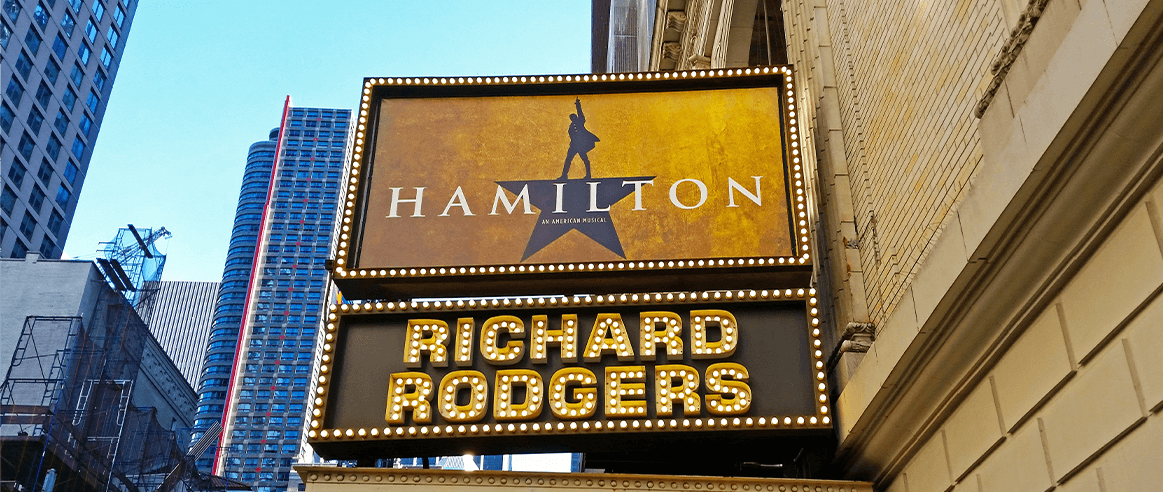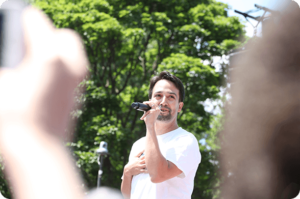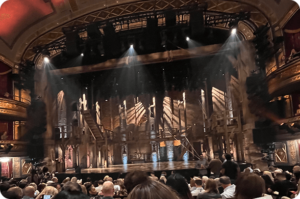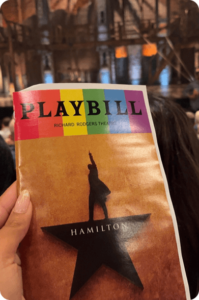Written by Jaden Parker
To bring both of ALLMYNE’s first series to a close, I wanted to discuss Hamilton, the award-winning Broadway musical by Lin-Manuel Miranda. While Miranda’s genius brought light to Alexander Hamilton’s history through hip-hop, it is widely known that his artistic rendition strays from the truth of events. Nevertheless, his tale is the one I had the privilege of witnessing in person this week; so it’s the one I will be referencing.
If you haven’t had the chance to see the show yourself or join the millions listening to the soundtrack, it’s an experience worth taking the time to enjoy. The word masterpiece was created especially for this musical. By expertly experimenting with storytelling, Lin-Manuel Miranda made Alexander Hamilton more accessible for people around the world. Seeing the musical in real life was so life-changing. The energy a Broadway cast always brings to the stage is something to definitely witness in one’s lifetime.
So, without further adieu, Alexander Hamilton’s life through the lens of Lin-Manuel Miranda and experience of a musical-goer.
(All quoted text is from Lin-Manuel Miranda himself. I don’t take any credit for his brilliant lines.)
“The ten-dollar Founding Father without a father” showed up from the Caribbean to New York in 1772. From there, his legacy would be solidified following his “accelerated course of study.” He, along with his friends at the time, was aware that there would “be a revolution in [their] century.” He knew the importance of “Freedom, something they can never take away,” and he continuously fought for that right through war and law-making.
“The revolution [was] happening in New York,” so he advocated for American freedom although he wasn’t born in the country. He could relate to the idea that “the have-nots [were] gonna win this,” as he was an outsider to America as an immigrant. For every battle, there are at least two sides; so, it was only fitting for the British King to miss having his “loyal, royal subject.” That’s where George Washington, our “venerated Virginian veteran” and first American president, came to save the day. Back then, the “Schuyler sisters [were] the envy of all,” especially Eliza, who would become the future Mrs. Hamilton.
“If it takes fighting a war for us to meet, it will have been worth it,” he flirted with Eliza. However, as history can show, Hamilton was “never satisfied” with his life, resulting in numerous affairs and constant writing. He was also not afraid of dying for his country, wishing to have “[Aaron Burr’s] command.” While Hamilton was a go-getter, chasing everything he wanted—perhaps because he’d come from nothing and had to always work hard to earn anything—Burr preferred “lying in wait.”
During the brutal battle against Britain, the American troops “resorted to eating [their] horses.” Amidst this, Hamilton and Burr had to agree—albeit in a moment of foreshadowing—that “duels are dumb and immature” during a petty argument that escalated to a fight between their comrades. Meanwhile, Hamilton was consumed by his need to “fly above [his] station” once the war was over in order to impress his peers and escape the stigma that had followed him since landing in America because he was an immigrant.
He was constantly concerned about Eliza “being a poor man’s wife,” and struggled to provide for her financially, although her family was wealthy. Luckily, a battle concluded in favor of the American army, allowing them to “leave the battlefield waving Betsy Ross’ flag.” At this point, those around Hamilton could recognize that “greatness lies in [him]” underneath all his arrogance. When Washington gave him a command of his own troops, he advised them to “take the bullets out [their guns]” to keep them from being detected by British soldiers.
When America finally reigned victorious over Britain and gained freedom, King George was left “fighting with France and with Spain.” Around this time, the Hamiltons welcomed their first-born Philip who would “come of age with [their] young nation.” Deciding to pursue law following the war, Hamilton realized that the “colony’s economy’s increasingly stalling” and devised a plan to fix the nation’s financial situation. Thomas Jefferson, a future U.S. president, was appointed to “be the Secretary of State (Great!)” in Washington’s cabinet alongside Hamilton as Secretary of Treasury.
Alexander realized that if Congress assumed state debts, then “the union [would get] a new line of credit,” but Jefferson, a strong advocate for his southern roots, opposed this idea. Hamilton neglected his wife and kids because he had to “get [his] plan through Congress,” or he would lose his job. This was when he started an affair with a Maria Reynolds who extorted him for money—of which Hamilton discovered after receiving “a letter from a Mr. James Reynolds,” her husband. While trying to keep his affair a secret by paying Reynolds, “Congress [was] fighting over where to put the capital” of their new nation.
Aaron Burr, Hamilton’s friend-turned-enemy, decided to take his chance and pursue his dreams, resulting in “Philip Schuyler (Hamilton’s father-in-law) [losing his] senate seat.” France, in a bind, asked America to return the favor they gave them when fighting against Britain, but Washington sided with Hamilton, asking him to “draft a statement of neutrality.” Following this betrayal of his former friend Marquis de Lafayette, a lot of people were fed up with Hamilton’s ego, leading people to “follow [his] money and see where it goes” in hopes they catch him being shady with the nation’s money.
Instead of continuing to sit as president, Washington, with Hamilton’s help, decided to step down, creating a precedent for future presidents to know “how to say goodbye” to their power every four years. Curiously, the people wondered if America was going to “keep on replacing whoever’s in charge,” something that hadn’t really been seen before. Following Washington’s retirement, Hamilton stayed busy, becoming the “creator of the coast guard [and] founder of the New York Post,” all establishments that continue to exist today.
Riding on his high horse, Hamilton’s past caught up with him when he had to defend whether he had “spent a cent that wasn’t [his]” in the face of being exposed. As if to excuse his behavior, he reminded his peers that he “wrote financial systems into existence,” deserving respect despite his alien status. To get ahead of the rumors, he published the infamous “Reynolds Pamphlet” which proved he’d “had a torrid affair.” When Eliza found out, it is not quite sure what her reaction was, as all correspondences have been removed from history; however, we are sure that she was aware that Hamilton was the type of man to “do what it [took] to survive,” especially because of the turmoil in which he grew up.
During this political scandal, Philip Hamilton had come of age and decided to protect his father against Mr. George Eacker who had “disparaged [his father’s] legacy in front of a crowd.” Told by Hamilton to “[aim] for the sky” during the duel, Philip was wounded by Eacker and died. As a result, “the Hamiltons [moved] uptown” to cope with the grief of losing a member of their family. Meanwhile, an election was coming up between Jefferson and Burr, and Jefferson realized he would need “a key endorsement” to win: Alexander Hamilton.
When Hamilton backed Jefferson, this was the straw that broke the camel’s back for Burr, who wanted Hamilton to “answer for the accusations [Burr laid] at [his] feet” regarding Hamilton’s continuous attempts to sabotage Burr’s happiness. A dumb and immature duel became the only answer, making Hamilton’s final “[meeting] at dawn.” Aaron Burr, Hamilton’s “first friend, [his] enemy,” killed him on the 12th of July in 1804. To keep his legacy going, Eliza opened “the first private orphanage in New York City” that stands today as the Graham Windham.
Before Lin-Manuel Miranda told the story of Alexander Hamilton, I—like many—had no clue that he was an immigrant. I had assumed that all of America’s founding fathers had been colonizers of the country. To realize how much Hamilton did for America while being viewed as an “other” due to where he came from was groundbreaking. This is something I think both the LGBTQIA+ and Caribbean communities understand to their core. In America, being someone different isn’t celebrated as much as it should. We can now see that immigrants and people of the gay community are changing the world for the better and should be recognized as the contributing members of society they are.












